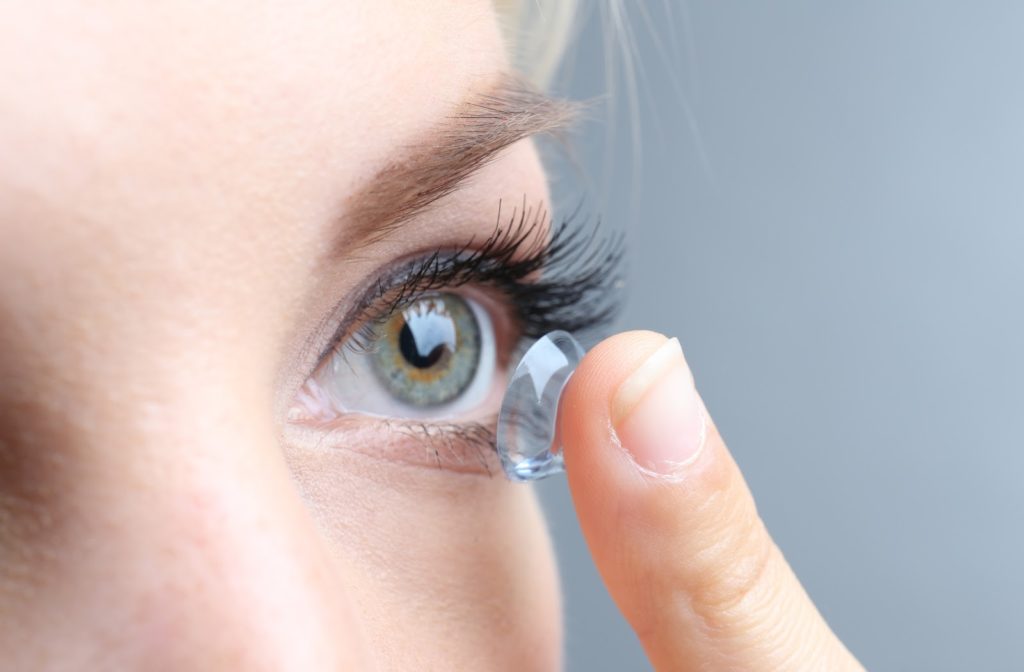If you wear contact lenses, how regularly should you replace them? It can depend on the type of lenses you have, but proper maintenance and care can help protect your eyes. Over-worn contacts can lead to more than irritation, causing discomfort and swelling.
If you have contacts, continue reading to learn more about why you should replace them regularly.
I Can Wear My Contacts Too Long?
It can be easy to leave your contacts in longer than the suggested wearing schedule. You might be tired after a long day and not have the energy to remove your contact lenses for the night.
This is called overwear, and it occurs when you wear your lenses past the suggested schedule or don’t remove your contacts regularly. Taking proper care of your contact lenses can help avoid complications with your eyes.
When Should You Replace Contacts?
When you replace your contacts depends on the type you have. There are a variety of lenses out today, and they can range from daily to monthly use.
Daily Disposable
Many contact lenses today are disposable, meaning you wear a new pair every day. You don’t need to remember to replace them because this happens every morning. You can throw your old lenses in the trash and wear your new contacts.
One to Two Week Disposable
These contact lenses are disposable after a week’s worth of use. They require overnight soaking in contact solution. After a week or two, you can fully replace your contact lenses with a new pair.
Monthly Disposable
You have to replace monthly disposables (you guessed it) monthly. The lenses must stay in solution every night while you sleep. If you have these contact lenses, try setting your replacement date at the beginning of each month to lower the risk of overwear.
Overnight Lenses
Some contact lenses you can sleep in overnight. The replacement period can vary for these types of lenses, between one week to 30 days. If you have overnight lenses, speak with your optometrist about the lens’s replacement period.
Contact lenses offer effective vision correction, but they require some careful handling and maintenance. Complications can develop if you don’t follow the correct replacement schedule or wear your lenses too long. You risk painful eye conditions such as giant papillary conjunctivitis.
What is Giant Papillary Conjunctivitis?
Giant papillary conjunctivitis (GPC) causes the inside of the eyelid to become red, swollen, and irritated. This condition includes large bumps appearing underneath the eyelid. People who wear contact lenses have a greater chance of getting GPC.
People who don’t wear contact lenses can still get this condition but at a much lower risk. The common causes of GPC include:
- Allergies to contact lenses or the chemicals in cleaning solution
- Contact lenses or exposed stitches rubbing against the eyelid
- Chronic eye allergies
- Deposits of proteins or other substances on the contact lenses
This complication can happen to anyone wearing contact lenses, no matter the experience they have with them.
Symptoms of GPC
The first sign of GPC is the inside of your eyelid becoming rough, red, and swollen. You may also experience:
- Swollen or droopy eyelids
- Excess mucus in the eye
- Red, painful, itchy eyes
- Feeling life your contact lens is shifting when you blink
- Bumps on the inside of the eyelid (papillae)
GPC Treatment
GPC can cause significant damage to your eyelid and cornea if not treated fast enough. Expect to not wear your contact lenses for at least a few weeks; the inside of your eye needs time to heal from this condition. Eye drop medicine or ointment can help reduce swelling and itching.
Your optometrist will recommend the best treatment plan based on your condition and unique needs. You can avoid complications with GPC by following your lens’s instructions and taking care of your contacts

Treat Your Lenses With Care
To lower your risk of GPC and other contact lens-related problems, follow some of these tips:
- Clean your lenses every time you take them out
- Don’t sleep in your lenses unless advised by your optometrist
- Replace your lenses on schedule (daily, weekly, monthly, etc.)
- Only use fresh & sterile solution to clean & store your lenses
- Don’t wear your contacts when you’re sick or your eyes are irritated
- Try to remove your contacts for at least 18 to 20 hours a week
Remember to have an annual eye exam and contact lens fit to make sure your eyes are healthy. You can protect your ocular health with diligent contact lens care and regular optometry visits.
Maintain Your Eye Health
Contact lenses are a great alternative to eyeglasses, but they require proper care. You can do this by keeping your contacts clean and following your optometrist’s instructions.
Stop using your contact lenses if you experience discomfort or irritation and visit your optometrist as soon as possible. If you’re showing signs of GPC or another eye-related problem, book an appointment.



